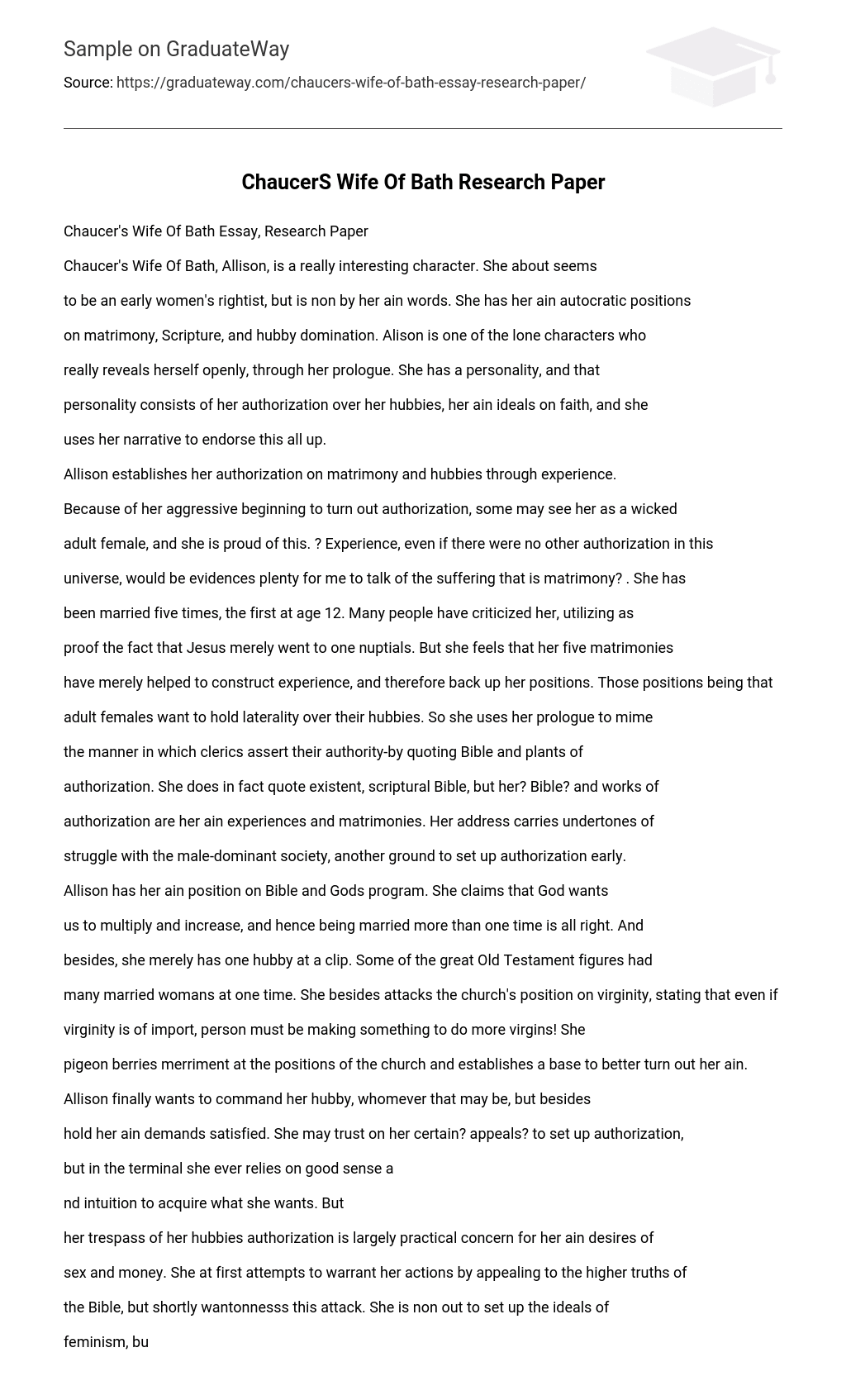Chaucer’s Wife Of Bath, Allison, is a really interesting character. She about seems to be an early women’s rightist, but is non by her ain words. She has her ain autocratic positions on matrimony, Scripture, and hubby domination. Alison is one of the lone characters who really reveals herself openly, through her prologue. She has a personality, and that personality consists of her authorization over her hubbies, her ain ideals on faith, and she uses her narrative to endorse this all up.
Allison establishes her authorization on matrimony and hubbies through experience. Because of her aggressive beginning to turn out authorization, some may see her as a wicked adult female, and she is proud of this. Experience, even if there were no other authorization in this universe, would be evidences plenty for me to talk of the suffering that is matrimony. She has been married five times, the first at age 12. Many people have criticized her, utilizing as proof the fact that Jesus merely went to one nuptials.
But she feels that her five matrimonies have merely helped to construct experience, and therefore back up her positions. Those positions being that adult females want to hold laterality over their hubbies. So she uses her prologue to mime the manner in which clerics assert their authority-by quoting Bible and plants of authorization. She does in fact quote existent, scriptural Bible, but her? Bible? and works of authorization are her ain experiences and matrimonies. Her address carries undertones of struggle with the male-dominant society, another ground to set up authorization early.
Allison has her ain position on Bible and Gods program. She claims that God wants us to multiply and increase, and hence being married more than one time is all right. And besides, she merely has one hubby at a clip. Some of the great Old Testament figures had many married womans at one time. She besides attacks the church’s position on virginity, stating that even if virginity is of import, person must be making something to do more virgins! She pigeon berries merriment at the positions of the church and establishes a base to better turn out her ain.
Allison finally wants to command her hubby, whomever that may be, but besides hold her ain demands satisfied. She may trust on her certain appeals to set up authorization, but in the terminal she ever relies on good sense a nd intuition to acquire what she wants. But her trespass of her hubbies authorization is largely practical concern for her ain desires of sex and money. She at first attempts to warrant her actions by appealing to the higher truths of the Bible, but shortly wantonnesss this attack. She is non out to set up the ideals of feminism, but to show her ain alone instance in a sympathetic manner.
This is why she needs to set up her authorization by experience, so she can warrant her actions merely by holding done them. Not merely is she able to command her hubby, warrant it, but besides reveals a sort of deepness non shown in the other characters. She seems much more existent, and sympathetic because she really thinks. Her narrative besides later proves her subject of laterality of work forces by adult females.
The narrative of the immature Knight establishes her doctrine as the proper and merely manner for the universe to work. But it accomplishes it in a different kind of manner. By doing the Knight, a male, force laterality unto a female, he commits a offense that can merely be righted be obeisance to a adult female, and by happening out what adult females truly want: laterality. But she besides proves that she is non merely a women’s rightist out to defend female laterality. She merely requires laterality in matrimony, and this is merely psychological control. She pays no attentiveness to the fact that work forces hold all the places of power in society, or that the adult female who gives the Knight in her narrative a opportunity can make so merely by pleading with her hubby.
But more significantly, since by allowing the old beldam have laterality and do her ain pick, both of them come out happy. By besides including this sub-moral into her narrative, Allison clearly shows that she is non wholly misanthropic to the thought of a reciprocally happy matrimony. But the existent message of the narrative, irrespective of her evident deficiency of existent life cynicism, is that adult females, ugly or just, should be obeyed in all things by their hubbies.
The Wife of Bath’s autocratic ego assurance is a elusive remark on the manner work forces thought of adult females. She proves that adult females can, and will rule and order their hubbies in matrimony. The ground that Allison’s character seems more existent is her self-cognizance, she seems to look at her life from a distance. Therefore she really thinks and has a quasi-dynamic personality.





